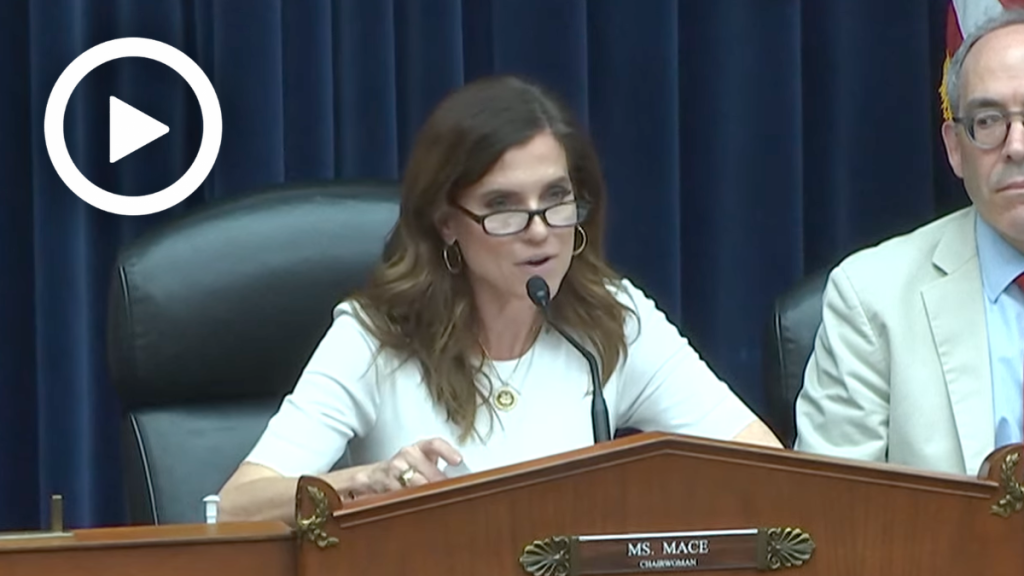
Mace Opens Hearing on Biden Administration’s Project Labor Agreements
WASHINGTON – Subcommittee on Cybersecurity, Information Technology, and Government Innovation Chairwoman Nancy Mace (R-S.C.) delivered opening remarks at a subcommittee hearing titled “Cutting Competition in Contracting: The Administration’s Pricey Project Labor Agreement Mandate.”In her opening statement, Subcommittee Chairwoman Mace highlighted how the Biden Administration’s rule on project labor agreements (PLA) is nothing more than a scheme to steer billions of dollars in federal construction contracts toward political allies. She detailed how PLAs raise costs on taxpayer-funded projects and cut out many American workers from federal construction projects.
Good afternoon, and welcome to this hearing.
We’re here today to expose the Biden Administration’s project labor agreement rule that took effect in January.
This rule is nothing more than a scheme to funnel billions of dollars in federal construction contracts to political allies.
It’s about ditching full and open competition, overriding the expertise of government acquisition professionals, wasting taxpayer dollars, delaying crucial projects, and discriminating against the nearly nine in ten construction workers who aren’t in a union.
Let’s look at the facts.
The rule mandates all contractors and subcontractors on large-scale federal construction projects work under a single project labor agreement.
Project labor agreements—PLAs, for short—are a type of pre-hire collective bargaining agreement with one or more unions that governs employer-employee relations on a construction project.
But why insist that construction firms arrange project work through unions? After all, only eleven percent of the Nation’s construction workforce is unionized.
Marginalizing the other 89 percent undermines the pursuit of “full and open competition,” a core tenet of federal procurement codified forty years ago in the Competition in Contracting Act.
Now, President Obama put a thumb on the scale back in 2009 by encouraging agencies to require PLAs on large-scale federal construction projects. But it wasn’t a mandate. If agencies didn’t think requiring a PLA was in the best interest of taxpayers, they could opt not to use one.
And guess what? They almost always opted not to use one. Contracting officers chose to require PLAs on only one out of every 167 large construction projects during the duration of the Obama and Trump Administrations.
And it’s no wonder. PLAs had their heyday before and during World War II, when the Nation’s construction workforce was mostly unionized. Today, it’s overwhelmingly not. So, to impose PLAs today by fiat is intrusive and inefficient.
That explains why research has shown that, where politicians have required PLAs for state and locally funded public construction projects, they raise costs by 12 to 20 percent, by discouraging merit shop bidders and imposing inefficient union work rules. That means fewer public schools are renovated and fewer public housing units are built.
Even the Boston Globe editorial board last month concluded that, “Project Labor Agreements are Bad Policy.” And half of all states—including South Carolina, do not even permit PLA mandates on state funded projects.
But we’re not here to second-guess how states and localities spend their public funds. We’re here to talk about a nation-wide PLA mandate for big federal construction projects.
Since federal procurement officers haven’t mandated PLAs, the Biden Administration decided to make that choice for them—favoring political expediency over professional judgment.
This rule forces agencies to require PLAs unless they can jump through vague, high bar hoops. Even showing that fewer contractors will bid on a PLA-required project isn’t enough, according to OMB’s memo.
Let’s be clear: I have no issues with a contractor working with unions or under PLAs. That’s why I support the Fair and Open Competition Act, or FOCA, a bill that Chairman Comer introduced and that we voted out of the full Oversight Committee. FOCA says you can’t discriminate for or against contractors or grantees based on their use of PLAs.
But the Biden Administration isn’t interested in a level playing field. They want this mandate to funnel taxpayer dollars and non-union construction workers’ earnings into union coffers.
I worry that in states like mine, the local construction workforce, which is overwhelmingly non-union, is going to find it hard to get work on federal projects right in their own backyard.
That’s because PLA hiring is typically done through union hiring halls. And even if non-union workers do get hired, they often suffer “wage theft” because they’re forced to pay into union pension funds they don’t benefit from.
The President is in the pocket of labor unions, plain and simple. The PLA rule is a blatant move to repay his union buddies by funneling billions in federal contracts their way. This administration isn’t interested in fair competition or relying on professional judgment; its about political favoritism and keeping union bosses happy.
The American people deserve better than a President who prioritizes union coffers over the livelihoods of hardworking, non-union construction workers across the Nation.
I look forward to hearing from our witnesses today, who will testify to the damage this PLA mandate will inflict.
But before I introduce them, I will first yield to Ranking Member Connolly for his opening statement.
EIN Presswire does not exercise editorial control over third-party content provided, uploaded, published, or distributed by users of EIN Presswire. We are a distributor, not a publisher, of 3rd party content. Such content may contain the views, opinions, statements, offers, and other material of the respective users, suppliers, participants, or authors.


